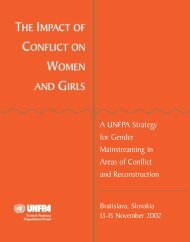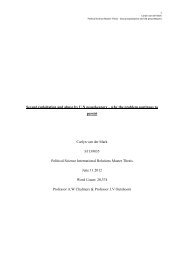Stop Sudah English-revised-March2012 - International Center for ...
Stop Sudah English-revised-March2012 - International Center for ...
Stop Sudah English-revised-March2012 - International Center for ...
Create successful ePaper yourself
Turn your PDF publications into a flip-book with our unique Google optimized e-Paper software.
mandate in articles 45 and 46 of Law No. 21 of 2001; and Law No. 26 of 2000 regarding a court <strong>for</strong><br />
serious human rights violations, and ensure that perpetrators of serious crimes are brought to trial,<br />
including perpetrators of sexual crimes and other violence experienced by women in Papua.<br />
• encourage the protection of women’s rights, the right to health, the protection of natural resources,<br />
and protection of the economic and labor rights of indigenous Papuan women, as well as eliminate<br />
racial discrimination, discrimination against women, including women living with HIV/AIDS,<br />
according to Law No. 7 of 1984 on the ratification of CEDAW, that includes reporting on the<br />
development of the situation of Papuan women in periodic reports to CEDAW and CERD<br />
Committees.<br />
• create a government regulation in the framework of restoration <strong>for</strong> victims of Violence and Human<br />
Rights violations <strong>for</strong> Papuan women victims of state violence.<br />
• create a recovery program <strong>for</strong> victims, especially to give recognition, reparations, and<br />
rehabilitation to victims of Militry Operation Zones (DOM), eliminate the OPM stigma, and conduct<br />
various activities <strong>for</strong> the recovery and empowerment of victims.<br />
• implement the Domestic Violence Law throughout Papua that includes the establishment and support<br />
of a safe house (women’s crisis center) <strong>for</strong> victims of domestic violence, and ensure that the police<br />
protect and take the side of female victims.<br />
To prove its good intentions, the Indonesian military acknowledges and prevents violence against women<br />
by:<br />
• issuing sanctions against its members who are perpetrators of violence against women and those who<br />
violate women’s human rights as well as implementing special measures to prevent and handle these<br />
cases.<br />
• acknoweldge and restore/repair victims of violence, including rehabilitation <strong>for</strong> children born as the<br />
result of sexual violence. 102<br />
• include a special curriculum in military education related to gender-based human rights <strong>for</strong> members at<br />
all levels, and create policies that prohibit sexual exploitation and violence against women with strict<br />
legal sanctions.<br />
To prove its good intentions, the Indonesian police <strong>for</strong>ce acknowledges and prevents violence against<br />
women by:<br />
• issuing sanctions against its members who commit violence against women and those who violate<br />
women’s human rights as well as implementing special measures to prevent and handle these cases.<br />
• ensure the rule of law in handling reported cases of violence against women, including rape, domestic<br />
violence, and others on the basis of Domestic Violence Law No. 23 of 2004 and Law No. 23 of 2002<br />
on Child Protection, and the Criminal Procedure Code, Law No. 7 of 1984 on the ratification of<br />
CEDAW, by creating mechanisms and special education about these laws.<br />
• provide gender-based human rights education, as well as knowledge of local culture, to its members at<br />
all levels.<br />
The National Commission on Human Rights (Komnas HAM) shall:<br />
• follow up this documentation report by developing a human rights investigation and conducting an ad<br />
hoc investigation into human rights abuses in Papua.<br />
• encourage the central government to establish a Truth and Reconciliation Commission in the Land of<br />
Papua.<br />
102 Reparation is an obligation of the state to restore victims of serious human rights violations. The <strong>for</strong>ms of reparation, as<br />
stated in the UN General Guidelines, include: compensation, restitution, rehabilitation, and fulfillment of satisfaction of the<br />
victim.<br />
ENOUGH IS ENOUGH! 54




![IANSA [PDF, 2MB] - PeaceWomen](https://img.yumpu.com/25206379/1/190x123/iansa-pdf-2mb-peacewomen.jpg?quality=85)
![Commitments Sample [PDF, 93KB] - PeaceWomen](https://img.yumpu.com/25206331/1/190x245/commitments-sample-pdf-93kb-peacewomen.jpg?quality=85)










![A Toolkit for Advocacy and Action [PDF, 260KB] - Peace Women](https://img.yumpu.com/25205989/1/190x245/a-toolkit-for-advocacy-and-action-pdf-260kb-peace-women.jpg?quality=85)